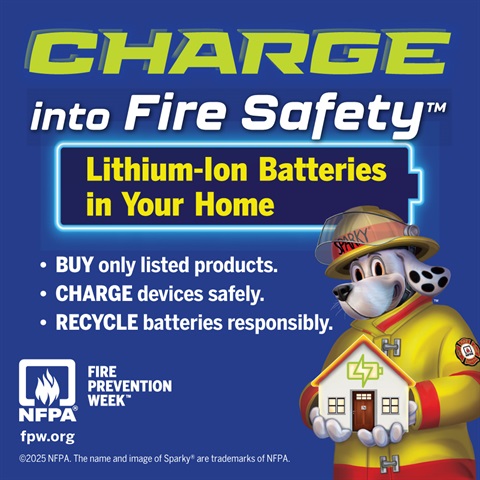Fire Prevention Week: Get to Know the Risks of Lithium-Ion Batteries
Published on October 06, 2025

The Melbourne Fire Department is teaming up with the National Fire Protection Association® (NFPA®) to promote this year’s Fire Prevention Week (October 5 – October 11) campaign, “Charge into Fire Safety™: Lithium-Ion Batteries in Your Home.” It highlights how important it is to buy, charge, and recycle lithium-ion batteries safely.
Most of the electronics we use in our homes every day — smartphones, tablets, power and lawn tools, laptops, e-cigarettes, headphones, and toys, to name just a few — are powered by lithium-ion batteries. In fact, most everything that’s rechargeable uses this type of battery.
If not used correctly or if damaged, lithium-ion batteries can overheat, start a fire, or even explode. To reduce these risks, look around your home — it’s important to know which devices are powered by them. "Lithium-ion batteries are powerful, convenient, and they’re just about everywhere," said Interim Fire Chief Shane Leech. "This year’s Fire Prevention Week campaign helps people understand the importance of using these batteries correctly to prevent fires in the home and to follow the Buy, Charge, and Recycle Safely approach."
Buy only listed products.
- When buying a product that uses a lithium-ion battery, take time to research it. Look for a stamp from a nationally recognized testing lab on the packaging and product, which means that it meets important safety standards.
- Many products sold online and in stores may not meet safety standards and could increase the risk of fire.
Charge devices safely.
- Charge your device on a hard surface. Don’t charge it under a pillow, on a bed, or on a couch. This could cause a fire.
- Don’t overcharge your device. Unplug it or remove the battery when it’s fully charged.
- Always use the cords that came with the product to charge it. Follow the instructions from the manufacturer.
- If you need a new charger, buy one from the manufacturer or one that the manufacturer has approved.
Recycle batteries responsibly.
- Don’t throw lithium-ion batteries in the trash or regular recycling bins because they could catch fire.
- There are several local options for disposing of or recycling used lithium-ion batteries:
- Visit Brevard County Solid Waste Management Department's Recyclopedia, call2recycle.org, or earth911.com to find locations to safely drop off and dispose of lithium-ion batteries.
- Local retailers such as Lowe’s, The Home Depot, and Battery Bulbs Plus participate in battery recycling programs and accept rechargeable batteries such as tools, phones and computer chargers.
- You can also take them to one of Brevard County’s household hazardous waste collection centers:
-
- 3379 Sarno Road, Melbourne (Monday–Saturday, 8 a.m. – 4 p.m.)
- 2250 Adamson Road, Cocoa (Monday–Saturday, 8 a.m. – 4 p.m.)
- 3600 South Street, Titusville (Monday–Saturday, 8 a.m. – 4 p.m.)
If you have any questions about fire safety, please contact the Melbourne Fire Department at 321-608-7900. For more information about Fire Prevention Week and lithium-ion battery safety, visit fpw.org.